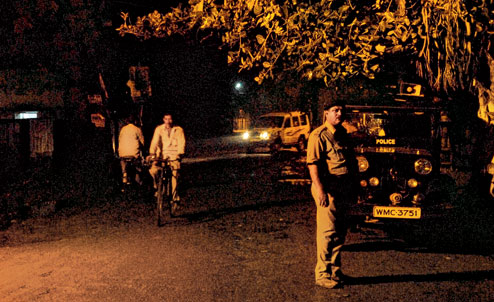| Dark corridor of dread |
 |
| A lone cop in front of a police vehicle parked near Kachari Maidan in Barasat on Monday evening. Picture by Sanjoy Chattopadhyaya |
The ladies had barely settled in their seats when the conversation veered to “the college girl’s gruesome death”.
In the ladies’ special leaving Sealdah at 5.35pm on Monday, the name Barasat could have been a synonym for fear. Many of those in the compartment were headed for the district headquarters of North 24-Parganas, where women now dread the very thought of returning home after dark.
As the motley group of commuters shared their predicament with each other, Metro sat in on the conversation.
The next 45 minutes on the Bongaon-Matribhumi local, which ferries thousands of women from the suburbs to Sealdah every day and back, showed how a husband, a father, a male sibling or a friend is their only shield on the home stretch.
Last Friday afternoon, second-year college student Shipra Ghosh was raped and murdered by a group of drunken men who, the police say, were waiting to catch a woman — any woman — passing by their vice den alone.
The spot where the 20-year-old was killed is several kilometres from the railway station, but the women who alight from local trains at Barasat, Hridaypur or any of the nearby stations are just as vulnerable to assault as Shipra was that day.
A schoolteacher in her 20s aboard the ladies’ special said she and her two school-going sisters would never walk that stretch alone after sundown.
“My father or some other male member of our family accompanies my sisters home on their way back from tuitions. On most days, my husband is there to pick me up from the station. In his absence, I take a van, though my home is barely 500 metres from the station. At least there are other women with me then,” said the woman, who teaches chemistry in a government school in South 24-Parganas, about 70km from her home.
It wasn’t always this bad.
“The change has been sudden and stark. The road is dark and there are groups of dubious-looking men who gather there regularly. They ogle, they make passes and sometimes they try to come close. Police presence is rare. They have surfaced after the college girl’s rape but that hasn’t led to a sense of security,” said the schoolteacher, who had travelled regularly to Jadavpur University for her post-graduation.
The most dreaded road is the one that runs along Kachari Maidan, a stretch of Barasat notorious for goons preying on women. It is a stone’s throw from the offices of the district magistrate and the district police chief but that hardly matters.
Two years ago, a cop deployed in one of those offices had cited his “duty to guard the gate” and refused to help Rinku Das while her brother Rajib was being beaten to death for resisting a gang of drunken youths who had tried to molest her.
Two floodlight towers have been installed on the ground since but large stretches remain dark, enough for the goons to lie in wait for targets.
“Barasat has so many schools and colleges, some of them exclusively for women, and yet this place has become so unsafe for us. Every other day, something or the other happens in front of the girls’ school, a stone’s throw from Barasat police station. But the police do nothing,” said a middle-aged woman.
But many like her have little choice but to pass through that stretch every evening.
“Police-tulis na... nijeder-i korte hobe (The police won’t be of any help. We have to resist),” a co-passenger declared.
“The police will come, see and go. We have to find a way to ensure our own security,” said the woman, who works in a post office in north Calcutta and commutes every day from Duttapukur.
A college student who commutes to Sealdah every day said she would wait at Barasat station until someone from her family came to escort her back. “I have strict instructions from home not to leave the station alone. Today, Baba is coming. On other days, my elder brother comes,” said the student of history.
“It is like jail sometimes, but girls of my age have learnt to live with it,” she added.
By train, Barasat is only 45 minutes from Sealdah, but it seems a different world. “Bye,” the college girl said with a charm that comes easy at her age.
“Don’t be alone in the area. It’s not safe here,” she advised, waving as she walked home with her father.
Kachari Maidan is a short distance from the station. The 500-metre stretch lined with the DM’s office, SP’s bungalow and other offices is a patch of light-and-shadow. A police jeep is parked near the motor vehicles office, the only police presence in the area.
There are small shops lining the road, whose shutters are downed by 7pm. “Very few people travel through this road after that. People are scared,” said a van-puller whose earnings dip as dusk descends.
A mother and daughter duo hurried past.
“There is no security here. Just five minutes ago, a girl’s mobile phone was snatched barely half-a -kilometre away,” the girl said.
She passed Madhyamik this year but her mother won’t let her go for tuitions alone. “Who will protect her? These days no one will even come to help,” the homemaker said.
A man selling puffed rice was packing up at 7.15pm. He was already late.
“The police vehicle you just saw will vanish any moment and then you are on your own, and at your own risk,” he warned










